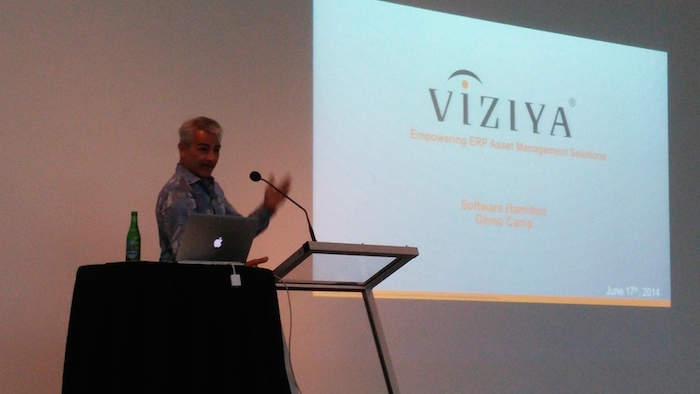Boring tech pays and other lessons from John Vujicic
Last week at DemoCampHamilton17 we had VIZIYA CEO John Vujicic give a keynote about the firm’s growth and lessons learned along the way. It was an engaging and refreshingly blunt talk.
VIZIYA is Hamilton’s most successful tech company by two of the most important measures – revenue growth and employee count. And yet you don’t hear about them much. Part of that’s because they do “boring stuff” – enterprise-level asset management software. I was half-expecting John to either gloss over that or play it up somehow, but he made it clear earlier in his talk they’re well aware that’s the case. I actually really enjoyed that he just completely owned that head on like that, like it was nothing to be ashamed about.

Here was my quick notes on lessons learned from John that night:
1) Boring tech pays the bills
Many of the startup apps developed locally have targeted “sexy tech” – social media, crowdfunding, gaming, etc. The stuff that you see in the mainstream tech media a lot, the stuff Silicon Valley does well, the stuff that can go viral. And though we have examples of people succeeding in these areas locally, especially in niche areas, there’s a lot of “boring tech” that seems to do pretty well at making money and creating jobs. Maybe we need to start owning and encouraging that more?
2) Give (a lot) before you get
VIZIYA has been able to work with major companies around the world. These types of clients have the revenues to make them really worthwhile, but how do you get companies this large as clients at all? One aspect is sales of course (see below), but how do you even get the ball rolling?
John talked about how VIZIYA had to work extremely hard for a single major partner first before they were able to work with other major firms – doing essentially whatever they had to do to keep this partner happy.
3) Sales matter
John really pushed the concept of sales, which wasn’t especially new. But he was particularly earnest about the need to hire sales people in the different regions that you are selling. He also emphasized that your competitors can crush you with superior sales if you neglect it yourself.
4) Residual revenues
John said something along the lines of “if you don’t think this matters, you’re in the wrong business”. He emphasized that residual revenues are required to keep you afloat over longer periods of time. By ensuring that at least your costs are covered by residual revenues, anything you make on top of this can be profit.
5) Create multiple products (battleship strategy)
Lots of people advise that startups should focus on an MVP, so it was interesting to hear a counter-argument that startups should throw multiple products at the wall and see what sticks. John gave an example of a massive German battleship that was sunk by a fleet of destroyers – sure a few destroyers were lost, but the battleship was sunk.
One weakness with the single MVP strategy is that, sure, you can try to iterate and build-repeat-learn until you find something that connects, but what if you’re searching in the wrong space altogether? By trying out and iterating different products you may increase your chances of a hit.
Easier said than done, but that’s the theory, and I suspect it applies in some cases.
